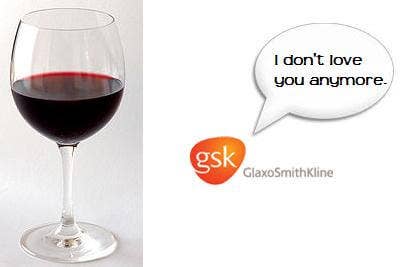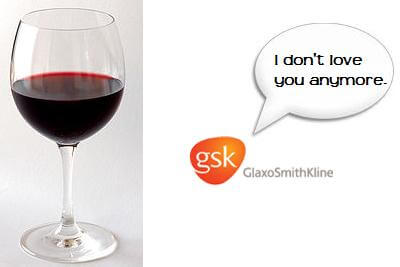GSK Drops Resveratrol. Could the Embattled Supplement Live on in Other Forms?

Share
Resveratrol has been hailed as the wonder substance, that stuff in red wine that could help you live a healthier and longer life. It seems like every pharmaceutical company would be lining up to develop it as a product. GlaxoSmithKline, however, is officially getting out of the resveratrol game. In name, at least. Early in December, GSK's subsidiary Sirtris announced that it had officially terminated its clinical trial for its proprietary formulation of resveratrol known as SRT501. According to the New York Times, the head of Sirtris, George Vlasuk, has stated that SRT501 "was not an important part of the acquisition of Sirtris by GSK...Resveratrol is not that important any more". Sounds like Vlasuk is throwing SRT501 under the bus. Yet if his statements are a death-knell for the pharmaceutical pursuit of resveratrol, the search for substances that duplicate its supposed properties is far from over. The company is focusing its efforts on SRT2104 and SRT2379, chemicals distinctly different from resveratrol, but inspired by its proposed effects on the body. Resveratrol is dead. Long live resveratrol.
2010 was not a good year for resveratrol. Pfizer and Amgen announced that their studies into the compound found no evidence that it activated the SIRT1 gene, which is the proposed target that resveratrol is supposed to stimulate to produce its health boosting effects. Amgen's reports also couldn't see evidence that the substance helped mice fed a high sugar diet - which flies in the face of the studies by David Sinclair at Harvard University that started much of the modern interest in resveratrol.
Add on top of that GSK's decision to suspend its SRT501 studies this spring and officially terminate them last month. The phase II clinical trial was meant to examine if SRT501 (hence, resveratrol) was safe for use with patients with multiple myeloma (a blood cancer). Five of the patients in that trial died of renal failure. In statements made to the Myeloma Beacon, GSK/Sirtris pointed out that the kidney damage was likely due to the disease itself, not SRT501. Yet they admitted that the side effects of the treatment - nausea, vomiting, diarrhea - could have exacerbated the problem. SRT501 was shelved for multiple myeloma, and with it a path to gain FDA approval for a pharm-giant backed version of resveratrol. Of course, GSK is not giving up on the drugs in Sirtris' pipeline. Again, in statements made to the Myeloma Beacon, the company indicated it was pressing forward with these new chemicals: "We are focusing our efforts now on more selective SIRT1 activator compounds that have no chemical relationship to SRT501 and more favorable drug-like properties. Currently we have two of these latest generation compounds (SRT2104 and SRT2379) in several exploratory clinical trials."
It's hard to know exactly how to take this chemical sleight of hand. The cynic in me likes to look at the money involved. GSK bought Sirtris in 2008 for $720 million, perhaps largely due to the success its founders, David Sinclair and Christoph Westphal, had with researching and developing resveratrol (and associated derived chemicals). Check out the 2008 highlight reel for Sirtris below to see what GSK was sold.
Be Part of the Future
Sign up to receive top stories about groundbreaking technologies and visionary thinkers from SingularityHub.


I don't know about you, but when I pay $720 million for a company I am going to damn well make sure that I pursue all my options before I write off the entire purchase as a flop. There's also the possibility that SRT501, which is essentially resveratrol under a different name, isn't chemically distinct enough for it to be profitable in the long run. If the drug had been shown to be effective other proprietary formulations for resveratrol could be created by other companies that might be sold in competition. Or perhaps even over the counter health supplement versions could have proven to be problematic for GSK. SRT2104 and SRT2379, which are distinctly different from resveratrol, could simply be intellectual property that is more easily defended from competition.
Or maybe we're getting exactly what GSK is proposing: new alternatives to the benefits of resveratrol without all that pesky nausea, vomiting, and diarrhea. For many involved in longevity research the focus has long been on the SIRT1 gene. If SRT2104 and SRT2379 are better at affecting the body's production of the SIRT enzyme, then it would make sense to pursue those chemicals over the SRT501 formulation.
In either case, GSK's dropping of SRT501 isn't going to be the end of resveratrol, not by a long shot. David Sinclair continues his work in the field, and his team is pursuing many different life-extending and health-augmenting experiments, including studies with resveratrol and rhesus-monkeys. According to the New York Times, both Sinclair and Westphal remain hopeful about the substance. Sinclair takes resveratrol as a supplement and told the NYT: “I'm as optimistic about the science and the potential of sirtuin activators as I’ve ever been."
Well, I'm less certain of the same every day. But I'm also not the scientist who managed to extend the life of obese mice and will likely be able to produce similar effects in monkeys. GSK, Amgen, and Pfizer look to be out of the resveratrol game, yet the science around it continues to go on. It's not over until the fat lady sings...and has her SIRT1 gene stimulated by medication.
[image credit:Andre Karwath via Wikicommons]
[video credit: OneVisionResources]
[sources: Sirtris, ClinicalTrials.gov, Myeloma Beacon, New York Times]
Related Articles

Sci-Fi Cloaking Technology Takes a Step Closer to Reality With Synthetic Skin Like an Octopus

This Week’s Awesome Tech Stories From Around the Web (Through January 10)

What If We’re All Martians? The Intriguing Idea That Life on Earth Began on the Red Planet
What we’re reading
